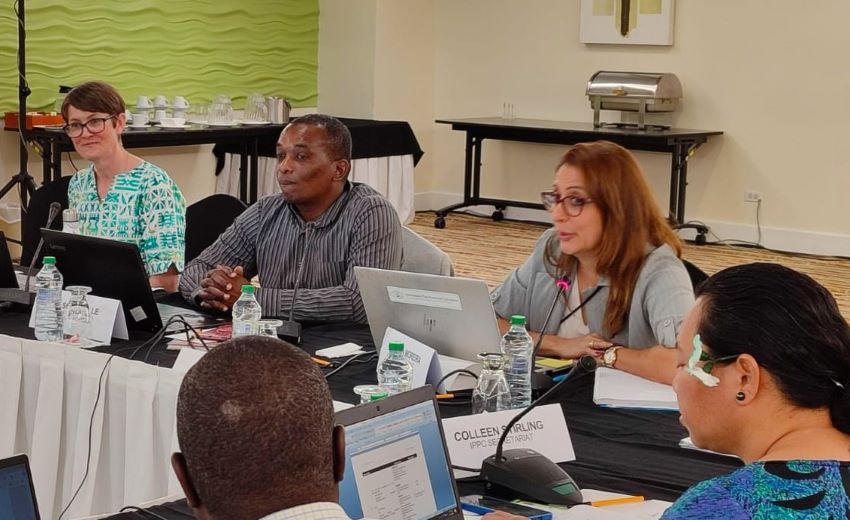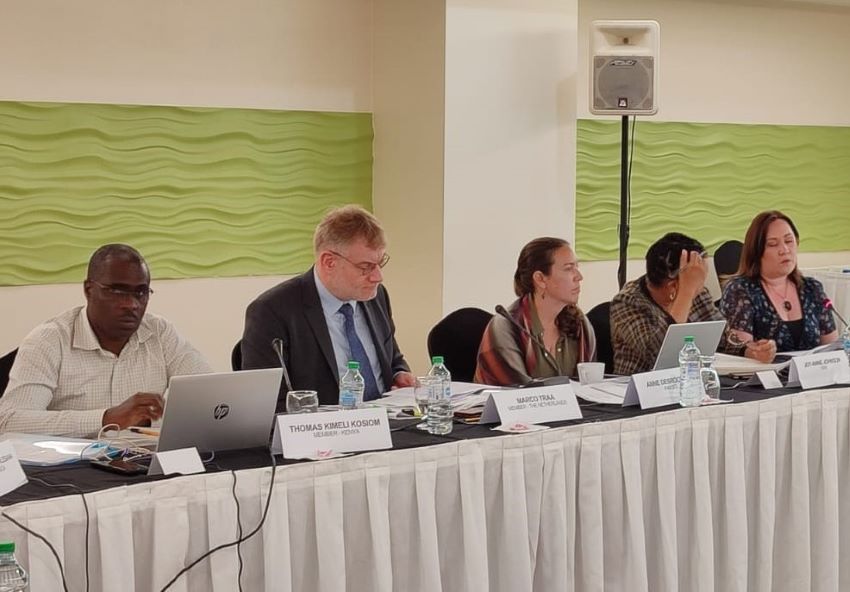
Chairman of the Group, Nelson Lavelle, look on. (F. Belgrave/BGIS)
In an effort to protect global food security and agricultural resources while ensuring the safe movement of humanitarian aid, a group of international experts on the International Plant Protection Convention (IPPC) is currently meeting in Barbados.
The focus group convened at the Radisson Hotel, Aquatic Gap, St. Michael, earlier this week, to address the risks associated with the movement of humanitarian aid and the potential spread of pests and diseases.
Chief Agricultural Officer, Michael James, in an interview with the Barbados Government Information Service (BGIS), highlighted the importance of this meeting against the backdrop of natural disasters, such as hurricanes.
“Our region is highly vulnerable to natural disasters like hurricanes … more recently, [Hurricane] Beryl. These events leave our island neighbours in urgent need of food and aid, but it’s critical to ensure that the assistance provided does not inadvertently introduce pests and diseases that could create long-term agricultural problems,” he stated.
During the week-long meeting, experts will engage in discussions on establishing new guidelines to minimise the risks associated with the movement of aid during emergencies.
“It’s a delicate balance. You need to help people immediately, but you also need to protect their future. That’s why this focus group is essential to ensure that when aid is sent, it’s done safely, minimising the risks to agriculture in the receiving country,” Mr. James explained.
He continued: “The outcomes of this focus group will form the basis for a new international standard, which will be reviewed and ratified by IPPC members before being implemented globally.
“This standard will help guide how food, plants, and even equipment used in disaster relief are inspected and treated to prevent the spread of pests.”
The group, which includes representatives from Africa, Asia, the Caribbean, and North and South America, is exploring how emergency provisions of food and other essentials can spread quarantine pests if proper protocols are not followed.
Also speaking to the BGIS was Director, Pacific Engagement and International Plant Health and Chief Plant Protection Officer, Department of Agriculture, Water and the Environment, Sophie Peterson, whose office initiated the discussion by the Southwest Pacific region and supported by Australia.
She said the meeting will focus on developing safer practices for the distribution of food, clothing, machinery, and other essential aid during emergencies.
Ms. Peterson, a representative for Southwest Pacific, noted that small island nations remain highly vulnerable to natural disasters, and this topic is of growing global importance.

“Our region is very vulnerable to natural disasters…. The issues of cyclones, tsunamis, volcanic eruptions, and sea level rise mean there is a growing risk that aid will be needed more in our region,” she stated.
The IPPC, with 185 contracting parties, plays a vital role in regulating global trade and reducing phytosanitary risks. However, according to Ms. Peterson, the diversity of countries involved in providing and receiving aid presents significant challenges.
“We need to find a solution that all countries can accept…. The IPPC provides a great foundation from a phytosanitary perspective, and then we need to bring in others to understand the bigger picture,” she said.
She indicated that a key outcome of previous discussions was the adoption of the Commission on Phytosanitary Measures (CPM) Recommendation Number 9, which focuses on the safe provision of food and humanitarian aid. However, more support is needed to implement these guidelines effectively.
“The Southwest Pacific region again considered that more support was really needed by them to be able to implement that CPM recommendation,” the Director noted.
She said the wide range of aid materials, such as food, clothing, building materials, and machinery, introduces a variety of pest and disease risks.
“There’s such a diverse range of things that can move, meaning there’s a very diverse range of pests and other risks involved,” she stated, as she highlighted the complexities of ensuring safe aid distribution.
The focus group is a critical step toward improving international collaboration in addressing this issue. “It’s great that it’s been recognised by the IPPC community that it is a risk, and now we’re just working to figure out how we might better support all countries to implement that CPM recommendation,” Ms. Peterson said.
